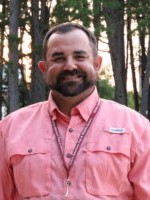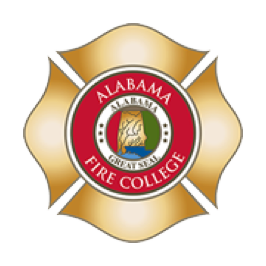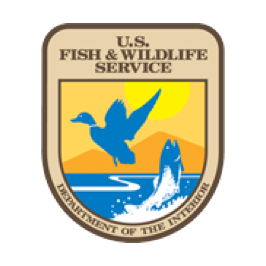Fall 2023 – From the Eagles Nest Newsletter
From the Eagle’s Nest
Fall 2023
What an incredible season of growth we’ve experienced over the past 3 months! We’ve enthusiastically welcomed some more amazing additions to our team, and have been busy with regional conferences, in-person trainings, and webinars. As we look ahead to the next 3 months of 2023, we are filled with excitement and anticipation for the opportunities and achievements that lie ahead!
Featured Articles
Message from the President
Message from the Executive Director
Fall Regional Conferences
Staff Additions
Conservation Law Enforcement Update
Education Update
The Bio Corner
Invasive Species
America the Beautiful Challenge Update
Funding Sources
Upcoming Events & Jobs
NAFWS in the News
Message from the President
Greetings NAFWS Members, Partners, Friends, and Family:
I hope you are all doing well. It’s been an exciting summer and fall season. There is so much going on with tribes and their Natural Resources. We have an ever changing environment. It’s that time again where we are in a time of changing seasons. The older you get, you start feeling the urge to get ready to tackle another winter season.
We have seen the spring flower blooms, adding fish and wildlife populations into the fall crop, felt the summer and fall heat waves, the transition of the freeze and thaw, growing seasons, and animal migrations are all examples of natural phenomena that follow seasonal patterns. We are experiencing a new added variable in this whole scheme called climate change. Climate change has altered many of these patterns such as shifting the timing of events like spring snowmelt, droughts, increasing temperatures, creating longer wildfire and growing seasons while reducing the length of time that lakes stay frozen, and more. These are just a few climate change phenomena we are experiencing.
The reason I mention this is that climate change has a large tribal impact. Tribal Nations are at the front lines of climate changes as it threatens the traditional lands, foods, and lifestyles of many communities. As a result, many Tribes are working to assess vulnerabilities and develop climate adaptation and resilience strategies. The NAFWS recognizes this and continue to monitor.
The Native American Fish and Wildlife Society (NAFWS) is a national tribal organization incorporated in 1983 to develop a national communications network for the exchange of information and management techniques related to self-determined tribal fish and wildlife management.
We are a membership organization. We have more than 200 member tribes. In Indian Country, few organizations address the unique needs of tribal fish a
nd wildlife programs. For more than 40 years, the Native American Fish & Wildlife Society has strived to meet the needs of its member tribes.
I am proud of our NAFWS successes. The NAFWS is here to assist tribes in natural resource stewardship, provide more opportunities for meaningful engagement of our members, agencies, and partners. Provide professional development, grant writing, outreach opportunities and all other not mentioned.
The NAFWS has grown in leaps and bounds. We can now help or assist tribes in Conservation Law Enforcement Officer funding and training, Alaskan Tribal Climate Resiliency Program, Wildlife disease and wildlife health, Invasive species, Wildlife Connectivity, fish and wildlife management, 30 X 30 Initiative, Justice 40 Initiative Climate Resiliency, America the Beautiful Grant, and provide educational support through Summer Youth Practicums, scholarships and trainings. I hope that I covered everything.
The NAFWS is here to provide as much support to tribes as we possibility can. The more we can assist will only help our natural environment and make it better for our tribal partners.
Hope you read and enjoy. The NAFWS has been very busy and hopefully with this newsletter finds it informative and helpful to you.
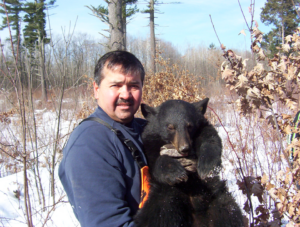
Thank you NAFWS members for your continued participation and enthusiasm in our professional community, I’d like to give a special shout-out of appreciation to our NAFWS Board of Directors, Executive Director and Staff, for their tireless effort working for tribes and their lands! They are sacred.
Thank you all!
Wishing you success
Donald J. Reiter, President
NAFWS
Message from the Executive Director
Greetings NAFWS members, partners, and friends. It was so great to see so many of you at the recent NAFWS trainings, summer youth practicums, and regional conferences.
The third quarter of 2023 proved to be just as busy as the first two. In July we attended the Wildlife Handling and Chemical Immobilization course hosted by the Penobscot Nation in Maine. We were able to learn useful skills such as wildlife handling, darting techniques, and hands on experience anesthetizing goats. I also did a “Montana Tribal Nation” tour visiting 6 Tribal nations in Montana in 4 days. It was great to get in the field and see firsthand all of the amazing work happening. We ended July and began August with a Board of Directors and Staff strategic planning session as well as a site visit to our 2024 National Conference location at the Treasure Island Resort and Casino in Welch, MN. It’s going to be an amazing conference thanks to our wonderful host the Prairie Island Indian Community.
July is also our time for the annual National Summer Youth Practicum in Colorado and for the first time, an Alaska Summer Youth Practicum. You can learn more about both here.
August was busy with trainings, such as the Pacific Tribal Bat Workshop and the SW Drone Training. We had the Southeast and Southwest Regional Conferences. A huge shout out to the Cherokee Nation and the Las Vegas Paiute Tribe for hosting. We had great turnouts at both and were able to visit and learn about the conservation work the Southeast and Southwest Tribes are doing. In addition, we welcomed two new Regional Directors: Matt Gamble, SE Region and Kai-t Bluesky, SW Region.
The team came together to review 17 Tribal America the Beautiful Challenge (ATBC) full proposals along with providing general technical assistance for many other Tribes. I conducted an ATBC site visit during my Montana Tribal Nations tour and Robert and I visited the United Keetoowah Band of Cherokee’s river cane ATBC project while we were in Oklahoma for the SE Regional Conference. You can read more about UKB’s project soon. We are all very excited for the 2023 ATBC grant awardees’ announcement later this fall.
September took us to the lands of the Sault Ste Marie Tribe of Chippewa Indians for the 36th annual Great Lakes Regional Conference. It was another wonderful event with great speakers, good food and beautiful scenery. We also welcomed Lori Petrauski as our Sr. Tribal Climate Resilience Liaison in September and look forward to continuing the work the AK Tribal Climate Liaisons team have been doing.
NAFWS continues to grow and are currently advertising and hiring for many positions. Please continue to follow us on our website and social media for upcoming events, trainings, and webinars.
The Recovering America’s Wildlife Act (S. 1149) has seen slow movement this year. However, we remain committed to seeing it pass and actively participate in the RAWA Alliance. Please continue to tell your stories to your communities, leadership and State, Federal, and private partners. We must continue to stress the importance of Tribes’ need for base funding for fish and wildlife.
Thank you all for your support of NAFWS and our mission of assisting Native American and Alaska Native Tribes with the conservation, enhancement and preservation of Tribal fish and wildlife resources. Thank you also for allowing me to serve in this position; one that I truly love. As always, if you have ideas for the NAFWS, please contact me or your regional director(s).
Pilamaye ye,
Julie Thorstenson, PhD (Lakota)
Executive Director
Fall Regional Conferences
Southeast Regional Conference
The Southeast held their annual conference in beautiful Tahlequah, Oklahoma hosted by the Cherokee Nation at the Cherokee Casino. Participants had the option to participate in a NAFWS Hunt Safe Program facilitated by NAFWS Fish and Wildlife Biologist, Sean Cross, the day before the conference started. The Southwest Regional Conference participants were joined by keynote speaker, newly re-elected Principal Chief of the Cherokee Nation, Chuck Hoskins Jr. for an inspirational address on perseverance, resiliency, and culture. Conference participants attended workshops on wild pig management as well as climate change impacts to wildlife habitat and migration corridors.
Event highlights: Cherokee Nation was gracious with their hosting responsibilities and presented our participants with the opportunity to see the true beauty of Oklahoma. Conference participants had the option to go on natural resource tours to the Cherokee Nation Hunting preserve and Sequoyah’s cabin or to the Buffalo Ranch with an ethnobotany jaunt and tour of the Saline Courthouse. Participants enjoyed a traditional feast at the Durbin Feeling Language Center, a recently built Cherokee language immersion center at the heart of language preservation and community.
CLEO Highlights: Three officers competed in the Southeast Regional Shoot Competition. Jeremiah Bird (Eastern Band of Cherokee Indians) won Top Gun and he will be joined by Kyle Efird (2nd- Eastern Band of Cherokee Indians) and Jay Harvey (3rd-Choctaw Nation of Oklahoma) to represent the Southeast at the 2023 National Shoot Competition.
Business Meeting: Matt Gamble, Senior Manager of Wildlife Conservation, Choctaw Nation of Oklahoma, was elected as the NAFWS Southeast Regional Director to serve a two-year term.
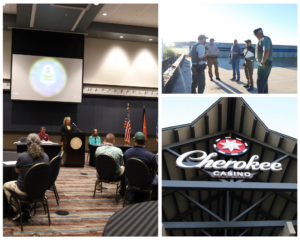
Southwest Regional Conference
The Las Vegas Paiute Tribe hosted the 2023 Southwest Regional Conference at the Palms Casino & Resort in Las Vegas, Nevada from August 21 – 24, with the theme of “Building Tribal Resiliency in a Changing World”. There were 31 Tribes represented within the total 226 participants. The conference began with workshops focusing on Climate Change, Hunter Education/Safety Training, Wildlife Connectivity and building a Wild Horse Management Plan.
Event Highlights:
Conference general session started with Las Vegas Paiute Chairwoman Deryn Pete, Navajo Nation Department of Fish & Wildlife Director Gloria Tom, and Las Vegas Paiute Council Member Alfreda Mitre sharing their kind and powerful words.
Concurrent sessions were in full swing, featuring captivating abstracts on wildlife management, traditional ecological knowledge (TEK), the incredible world of pollinators and insects, the pressing issue of climate change, habitat restoration, and the intricate realm of fisheries
CLEO Highlights: See Robert Romero’s CLEO Update
Regional Awards:
The Southwest Regional appreciates all of the dedication and hard work towards conserving, protecting and enhancing natural resources.
- Technician of the Year: Theo Guy, White Mountain Apache
- Leadership Award: Gloria Tom, Navajo Nation
- Administrative Staff of the Year: Aileen Hale-Chee, Navajo Nation
- Emerging Professional of the Year: Crystal Miller, Walker River Paiute
Election Results:
Congratulations to Kai-t for being elected as the Southwest Regional Board Member. Special thank-you to Elveda Martinez from Walker River Paiute, who has served as the NAFWS President for the past 4 years.
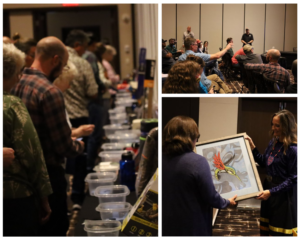
Great Lakes Regional Conference
NAFWS Great Lakes Region held their 36th annual regional conference at the Kewadin Casino in Sault Ste. Marie, Michigan from September 10 – 15, 2023 hosted by the Sault Ste. Marie Tribe of Chippewa Indians. The conference was filled with 126 participants representing 23 Tribes. Conference opening ceremony began with a posting of the colors by GL regional CLEOs to the Flag Song by the Bahweting Singers.
Event Highlights:
NAFWS and Great Lakes Region appreciate the presence and networking with a group from Brazil that shared their stories surrounding their conservation and community efforts. Participants started the week with attending workshops focused on wildlife disease/collection techniques, invasive species and remote operated vehicle training. Additionally, conference attendees participated in a golf tournament, traditional lacrosse game, and enjoyed a traditional feast prepared by the Sault Ste. Marie Tribe of Chippewa Indians.
CLEO Highlights: See Robert Romero’s CLEO Update
Regional Awards:
Great Lakes Regional Conference came to a close on Thursday with their awards banquet and with entertainment from Tyler Detloff artist from Sault Ste. Marie Tribe.
We had a lot of individuals to celebrate and give recognition for their service in the natural resource professions.
- Glen T. Miller Tribal Leadership Award: Whitney Gravelle, President, Bay Mills Indian Community, Michigan.
- Herman D. Lussier Great Lakes Technician of the Year: Madison Bear, Invasive Species Specialist, Fond du Lac Band of Lake Superior Indians
- Patricia Zakovek Conservation Officer of the Year Award: Timothy Mallory, Conservation Officer, Little Traverse Bay Bands of Odawa Indians Natural Resource Department
- William Eager Biologist of the Year Award: Tom Gorenflo, Biological Services Division Director, The Chippewa Ottawa Resource Authority Biological Services Division
Election Results: Terry Metoxen was re-elected as the GL Region Director and Al Fox and Doug Craven retained their positions as Alternates.
Staff Updates
NAFWS is so excited to welcome TWO new directors to our board and two new additions to our staff. Welcome to the team; we cannot wait to see all the good you will do at the society!!
- Representing the Southeast region: Matt Gamble, Senior Manager of Wildlife Conservation of the Choctaw Nation of Oklahoma.
- Representing the Southwest Region: Kai-T Bluesky, Wildlife Biologist and Lt. Governor of Cochiti Pueblo.
- Lori Petrauski, Senior Alaska Tribal Climate Resilience Liaison
- Megan Hawkins, Grants Coordinator
Conservation Law Enforcement Officer Update
Robert Romero, Deputy Executive Director
Hello to all! I hope this message finds you well. During this past quarter, the NAFWS has sponsored several different types of training for our CLEOs at various events. The following is a summary of activities from July through September 2023.
In July, the NAFWS Hunt Safe Program was presented to Tribal staff at the Oglala Sioux Parks and Recreation office, Wounded Knee, SD, where 3 officers participated
In August, the NAFWS staff was busy with travel to support the Southeast and Southwest Regional Conferences in Tahlequah, OK and Las Vegas, NV, respectively. Three Southeast region CLEOs attended the conference and participated in a NAFWS Hunt Safe Program workshop and Wild Pig Management workshop; a federal case review presented by the USFWS/OLE and U.S. Attorney’s Office, and participated in the Southeast CLEO PPC. The shoot team results were:
Top gun – Jeremiah Bird, Eastern Band of Cherokee. Score of 1,595.
2nd place – Kyle Efird, Eastern Band of Cherokee. Score of 1,541.
3rd place – Jay Harvey, Choctaw Nation of OK. Score of 1,498.
The Southwest conference was attended by 17 regional CLEOs who participated in a NAFWS Hunt Safe Program workshop; an 8-hour course focused on Body-worn Cameras, Civilian Recording and Social Media – New Legal Challenges presented by the Dolan Consulting Group; and 13 officers competed in the PPC. The following are the shoot team results for the Southwest conference:
Top gun – Curtis Chapoose, Ute Tribe. Score of 1,759.
2nd place – Garrett Manygoats, Navajo Nation. Score of 1,736.
3rd place – Elridge Vigil, Jicarilla Apache Tribe. Score of 1,728.
4th place – Brandon Tsosie, Navajo Nation. Score of 1,658.
5th place – Ruben Peralta, Mescalero Apache Tribe. Score of 1,653.
1st Alternate – Travis Owl, Quechan Indian Tribe. Score of 1,613.
2nd Alternate – Charolette Marks, Navajo Nation. Score of 1,568.
In September, the staff traveled to the Great Lakes Regional Conference in Sault Ste. Marie, MI to support their regional conference. A total of 29 regional CLEOs and 2 Great Plains CLOEs attended the conference and participated in law enforcement specific training to include tactical medical, legal review and updates, Hunt Safe Program workshop, and an impromptu regional CLEO meeting/discussion. Training was provided by a Little River Band of Ottawa Indians CLEO, USFWS/OLE and the NAFWS. Twenty-eight CLEOs participated in the PPC and regional team results were:
Top gun – Kevin Modlin, Pokagon Band of Potawatomi. Score of 1,168.
2nd place – Brad Cameron, Bay Mills Indian Community. Score of 1,162.
3rd place – Tim Mallory, Little Traverse Bay Band of Odowa Indians. Score of 1,156.
4th place – Todd Turner, Nottawaseppi Huron Band of the Potawatomi. Score of 1,139.
5th place – Ryan Pedley, Nottawaseppi Huron Band of the Potawatomi. Score of 1,129.
1st Alternate – Darren Seppala, Fond du Lac Band of Lake Superior Chippewa. Score of 1,105.
2nd Alternate – Lakota Raphael, Grand Traverse Band of Ottawa and Chippewa Indians, and Cole Thompson, White Earth Nation. Tied score of 1,103.
Note: These total scores are based off an average of two courses of fire only.
During the last week of September, the NAFWS sponsored a 40-hour CLEO training event at the NRA Whittington Center near Raton, NM. The training was attended by 10 CLEOs from the Southwest, Southeast and Great Plains regions of the NAFWS. The agenda consisted of the following presentations/topics for the week – Human/Wildlife Conflict Management; Lacey Act/BGEPA review and updates; Tribal and Federal case presentations; Tactical Medical training; Legal updates; Tactical Extraction/Felony Stop scenarios; Defensive Tactics; Live-fire and Virtual based Firearms training; ARPA review and training opportunities; and Tribal/State MOA specific to conservation officer training for Tribal officers. Training was presented by USFWS/OLE, U.S. Attorney’s Office, Bureau of Indian Affairs, New Mexico Game and Fish, Three Affiliated Tribes, and the Jicarilla Apache Tribe.
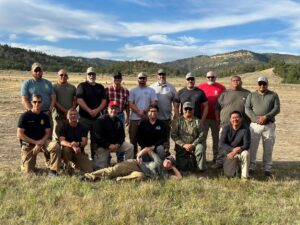
The NAFWS, Great Lakes CLEO Program and the Pokagon Band of Pottawatomi Indians were sponsoring a Joel Hardin Professional Tracking Services tracking class scheduled for October, but unfortunately the course had to be postponed to Spring 2024 based on minimal registrations. Hopefully, the re-scheduling will promote more interest and this course can move forward with much involvement.
With that said, other planning has begun to develop CLEO specific training for the 2024 calendar year and the annual National Conference at the Prairie Island Indian Community in May 2024. If you have any ideas or input for training needs, please feel free to contact me.
Lastly, on September 29, 2023, the NAFWS Board of Directors unanimously approved the establishment of a Conservation Law Enforcement Officer Committee which will be composed of seven voting members (one from each region) and two ex-officio members (Regional Directors selected by the CLEO Committee), who will meet quarterly to identify, develop and plant training/programming; advocate for CLEO funding; establish regional and national CLEO objectives; and review, revise, and promote the NAFWS Hunter Education Program. This is an exciting opportunity for CLEOs from all regions to participate in discussions to move this program forward progressively.
Thank you all for what you do to serve your respective communities!
Education Update
This year’s National Summer Youth Practicum had 16 student participants and was held from July 15 – 22, 2023 at the Colorado State University (CSU) Mountain Campus near Fort Collins, CO.
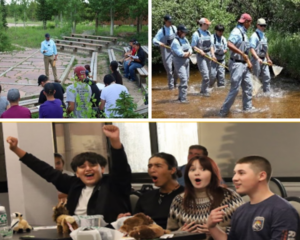
Our week was filled with tons of outdoor activities and lectures from a total of 20 speakers that included guest speakers and NAFWS staff which happened at two
different locations: CSU Mountain Campus and CSU Main Campus. Students learned from guest speakers such as Adam Baca (Colorado Parks & Wildlife) who spoke about wolf reintroduction to Colorado and its human dimensions implications; Assistant Secretary of Indian Affairs, Justice Rhodes mentored students about Tribal funding/finances as well as government relations and Indian Law; Alberto Rey and Jason Dilworth from State University of New York – Fredonia led the fisheries day along with Christopher Carrol and Aurelia DeNasha from U.S. Forest Service. Students were filled with great comments, questions and laughter.
A new element introduced to the National SYP in 2022 is the Wildlife Management Challenge. This challenge includes students divided into groups with the goal of using their knowledge gained from the week’s presentations to develop a wildlife management proposal to present on the final day. A student group was selected by the NAFWS Staff based on the quality of their proposal and presentation to attend the 2024 NAFWS National Conference to present their plan. Congratulations to Cody, Eshpaa, Maya and Xan!!
After the National SYP, we had the opportunity to review amazing applicants for the NAFWS Scholarships. We would like to congratulate:
- Aaron C., Jemez Pueblo, National Scholarship – $2500
- Crystal M., Walker River Paiute Indian Tribe, National Scholarship – $2500
- Ashley M., Hopi & Santa Ana Tribes, Southwest Regional Scholarship – $2000
- Bailey N., Navajo Nation, Southwest Regional Scholarship – $2000
- Brady T., Ho-Chunk & Navajo, Great Lakes Regional Scholarship – $2000
- Kendra W., Menominee Indian Tribe of Wisconsin, Great Lakes Regional Scholarship – $2000
- Jules E., Oglala Sioux Tribe, Great Plains Regional Scholarship – $1500
- Sumaya Quitugua, Acoma Pueblo / Chamorro, National Scholarship – $1000
- Melvita Nez, Navajo Nation, National Scholarship – $1000
- Angelisa Hoffman, San Carlos Apache Tribe, National Scholarship – $1000
- Ciara Benally, Navajo Nation, National Scholarship – $1000
- Redgy Rustin, White Mountain Apache Tribe, National Scholarship – $1000
We wish for many blessings, happy studies and good luck to our Native scholars.
If you have any ideas, comments, questions regarding the NAFWS youth programs and outreach, please Contact Us.
The Bio Corner
Laurel James, Director of Programs
WILDLIFE HEALTH And Our ONE HEALTH INITIATIVE
Dr. Tolani Francisco Dr.-Franciscos-Bio.pdf (nafws.org) has been working in collaboration with the NAFWS to provide information for our tribes regarding Wildlife Health. She carried out a bi-monthly webinar series this year tackling environmental stewardship and zoonotic diseases, as related the One Health Initiative. The series started in 2022 and addressed the following issues:
December 7, 2022 – Prion Diseases.
February 1, 2023 – More Than Marijuana.
April 5, 2023 – Invasive Species and the Diseases They Bring.
June 7, 2023 – Avian Health.
August 2, 2023 – Rabies.
October 4, 2023 – Let’s Talk About Poop (upcoming)
Each of the webinars examined the Zoonotic concerns behind each of the subjects. Perhaps one of most notable was the webinar “More than Marijuana”. This webinar discussed all of the potential environmental impacts to humans and animals from the chemicals and the waste products left on the landscape and what impact they have on wildlife, plants and water.
The final webinar, scheduled for 4 October 2023 (Register here: One Health Webinar Series- Let’s talk about poop – Native American Fish and Wildlife Society (nafws.org) ) will be a discussion on waste material aka feces and how it impacts wildlife, plants, fish and human life. There are reasons sewage lagoons are fenced off, why it is not a good idea to have waste material left laying about. Join us for a very intriguing discussion on “Poop” – be sure to register and join us in the final webinar of 2023!
All previous webinars can be viewed on the members portal on the NAFWS website and this provides another reason to be a NAFWS member!
The BIO team is Hiring!
With funding we have received from the US Geological Survey, we are currently looking to fill a Tribal Mapping Analyst position. This will be a 3-year, full-time, remote position. If you have the skills/experience in ungulates, data management, R programming, python and GIS in describing complex migration phenomena then submit your application to join our team. The job announcement and information on applying can be found here: Jobs – Native American Fish and Wildlife Society (nafws.org)
Also, please stay tuned to our jobs page as we will be searching for a Climate Change focused Fish & Wildlife Biologist, in the coming months.
JOIN US AT THESE UPCOMING CONFERENCES & WORKSHOPS:
- The Pacific Regional Conference will be hosted by the Coeur d’Alene Tribe October 16-19, 2023 in Worley, ID.
- The Northeast Regional Conference will be hosted by the Penobscot Nation November 6-9, 2023 in Millinocket Lake, ME.
- September 27, 2023 in Vancouver, WA.
Electrofishing Training co-hosted by the NAFWS in coordination with Smith-Root. Electrofishing Training – Native American Fish and Wildlife Society (nafws.org)
Through a partnership between the NAFWS and Smith-Root a two day training on electrofishing will be held in Vancouver, Washington from September 27-28, 2023. This course will cover minimizing/eliminating potential harm to fish, proper electrofishing settings to maximize capture efficiency, electrofishing across a spectrum of water conductivities, working safely as a team in a variety of environments, techniques and settings for a variety of different species, operation and safety, including dangers to humans and fish, and electrofishing techniques for lentic and lotic environments.
- October 17, 2023 in Ignacio, CO
Electrofishing Basics (CSP2205) Co-hosted by the NAFWS, USFWS National Conservation Training Center and the Southern Ute Indian Tribe. Electrofishing Basics – Native American Fish and Wildlife Society (nafws.org)
The NAFWS and the USFWS National Conservation Training Center is conducting an in the field electrofishing course in the Southwest Region hosted by the Southern Ute Indian Tribe October 17 – 20 in Ignacio, Colorado. This class builds knowledge and skills that will enable biologists to increase the standardization and efficiency of electrofishing sampling while operating in a safer manner. Topics include an overview of equipment and applications, safety, transport, assembly, water conductivity and turbidity measurements, crew communications, control settings, accessory equipment, and electrofishing gear.
COMPLETED REGIONAL CONFERENCE WORKSHOPS:
The Bio Team has been busy these past few months carrying out training programs and workshops for our tribal communities.
CALENDAR OF EVENTS:
- Southeast Regional Conference – was hosted by the Cherokee Nation August 14-17, 2023 in Tahlequah, OK.
- Southwest Regional Conference — was hosted by the Las Vegas Paiute Tribe August 21-24, 2023 and was held in Las Vegas, NV.
- The Great Lakes Regional Conference was hosted by the Sault Ste. Marie Tribe of Chippewa Indians September 10-15, 2023 in Salt Ste. Marie, MI.
Climate Change Workshop
Laurel James, Director of Programs assisted in completing a climate change full day, pre-conference workshop on August 21st, covering the following topics as part of the SW Regional Conference:
- Climate Adaptation planning
- “High water on the Walker River Paiute Reservation due to a Change Climate and Record Setting Show – using drones to monitor river flows”
- Climate change impacting the Navajo Nation
- Climate Change and Hot Temperatures in Timbisha Country
- Understanding and Addressing Drought Vulnerabilities and Information Needs for Tribal Communities within and adjacent to the Colorado River Basin
And finally, the day was wrapped up with an open discussion about the impacts felt in Indian Country. In total, we had 26 attendees at this pre-conference event and the discussion was amazing.
Wildlife Connectivity & Corridors Workshop
Shailyn Wiechman, Fish & Wildlife Biologist coordinated this workshop that was very well attended. Thirty-seven (37) professionals participated in discussions and presentations surrounding:
- Build partnerships and awareness to protect wildlife movements across the landscape
- Research outcomes on wildlife connectivity and wildlife-vehicle collisions
- Opportunities in policy regarding connectivity conservation
- Corridor and connectivity planning
- Decision-support tools for wildlife crossings: how to make the best decisions about where and how to install crossings
- Tribal initiatives and projects
- Analytical tools for identifying migrations and corridors
- Connectivity mapping efforts at the state, tribal, and federal levels
- Guiding collaboration and knowledge transfer between wildlife and transportation departments
- Federal funding opportunities
- Wildlife considerations in a transportation agency’s standardized procedures.
- Transportation agencies should work with outside agencies and others to plan, fund, and construct wildlife crossing structures
- Incorporate wildlife needs into transportation planning projects
- Connect agencies that have similar wildlife mitigation missions
- Fund projects that build safe passageways for wildlife
OTHER TRAINING PROVIDED BY NAFWS, FOR TRIBES:
An Introduction to the Endangered Species Act Webinar
Emily Hagler, Fish & Wildlife Biologist coordinated this training: Endangered Species Act (ESA) of 1973 is the most significant piece of endangered species legislation in the United States and is considered one of the world’s most important conservation laws. NAFWS partnered with U.S. Fish and Wildlife to provide a review on the different sections of the Act and how the Act is implemented. The presenters covered definitions, the listing and delisting processes, recovery, state and interagency cooperation, consultations, and permitting and landowner agreements. Participants had the opportunity to better understand the ESA and ask questions of the U.S. Fish & Wildlife Service presenters.
Drone Training Reno, NV
Emily Hagler, Fish & Wildlife Biologist: Through a partnership between the Native American Fish and Wildlife Society, Walker River Paiute Tribe, and the Great Lakes Drone Company a comprehensive drone training was held in Reno, Nevada, August 28 – September 1, 2023 at the Peppermill Casino. This workshop was open to NAFWS members and member tribes within the Pacific Northwest and Southwest regions. This three-day training addressed a variety of topics related to basic maneuvers, flight planning, aerial mapping, automated flight routes, 2D and 3D map considerations, LIDAR, and thermal imaging. The training was a mix of classroom and field applications. Fourteen tribes were represented in this training. Many participants will go on to receive their 107 pilots’ license.
Bat Workshop
Sean Cross, Fish & Wildlife Biologist: The Native American Fish and Wildlife Society, U.S. Geological Survey, Bureau of Indian Affairs, National Park Service, Yakama Nation, and Oregon State University teamed up to provide a bat monitoring and management workshop in the Pacific Northwest in Toppenish Washington attended by 23 professionals from throughout the Pacific Northwest. The workshop was conducted on August 8-9, 2023, and was comprised of a classroom learning environment and a night of mist netting and acoustic surveys. The workshop addressed topics related to awareness and importance of bats on tribal lands, as well as threats, field techniques, data gaps, monitoring programs, acoustic equipment, proper bat handling and care procedures and policies and cooperative management examples. Guest speakers were experts on bats from tribes, local and national agencies, universities, and organizations focused on bat conservation.
Hunt Safe Instructor Course
Sean Cross, Fish & Wildlife Biologist: The NAFWS has worked with the IHEA to institute a World certified hunter’s education course tribes can use to train new and upcoming hunters. The course is recognized by 19 countries (Australia, Austria, Canada, Denmark, England, France, Germany, Hungary, Italy, Mexico, Netherlands, New Zealand, Norway, Peru, South Africa, Spain, Sweden, Switzerland, and the United States). The course is fully accredited by the countries listed above, of which all 50 U.S. states, the ten provinces and three territories of Canada, and the 31 United Mexican States confer reciprocity. The first step in implementing this program for tribes is to assemble a cadre of certified instructors who can successfully deliver the course to students across Indian County. Instructor Courses have been completed at four locations this year, Pine Ridge Indian Reservation,
Sean provided this training at the following: the Southeast Regional Conference, the Southwest Regional Conference, and the Great Lakes Regional Conference and a total of 77 personnel completed the course for instructor certification and existing state certified instructors are signing up via the online instructor registration page LearnHunting.org.
Midwest Beaver Summit 2023
Hannah Juliussen, our Biodiversity focused Fish & Wildlife Biologist and Laurel Jameas attended the virtual, Midwest Beaver Summit that was co-hosted by The Superior Bio-Conservancy, the Illinois Beaver Alliance, American Rivers, Heartland Rewilding, Friends of the Chicago River, Native Range Ecological, LLC, The Beaver Institute, and Midwest Beaver Management and in September 2023. The focus of this summit included emphasizing beaver’s importance in our ecosystems and a discussion of non-lethal management practices. One of the most interesting things topics was the idea of an “ecological amnesia,” referencing the idea that we are so far removed from how we used to relate to the land and animals that we don’t see a way to work with beavers, managing in a non-lethal way. Coming from a tribal perspective, our goal is to maintain a strong connection with our land and ecosystems, working as a part of a much larger picture. It was nice to see western science reinforce this ideal. This workshop will help the NAFWS in addressing restoration management issues. Keep your eyes peeled, we are looking at hosting a Beaver Worksohps/Training in 2024, in collaboration with the Tulalip Tribes. We are still in the pre-planning stage so, stay tuned for updates!
Lack of Attention Only Hampers True Control
- Mitzi Reed, Invasive Species Coordinator
As I was driving down to Bogue Homa, a little Choctaw tribal community down in south Mississippi, where the exterior tribal boundaries are separated by 90 miles of non-tribal lands, to visit family and friends for the American Indian Day Celebration, I could not help but see the spread of kudzu along the Mississippi county roads and highways. It jumped out to me how aggressive and opportunistic this plant can be. I have traveled these roadways for years and recall that these same areas that are now infested with kudzu are the same areas that had been destroyed by tornadoes and disturbed by clearcutting over the past few years.
Recently, I was asked if there was a way to control kudzu. Profoundly, the answer is yes, but you must be as aggressive in the control as the plants’ growth. It never fails…Nothing is ever a problem until it begins to impact an area that has value for man. Take kudzu, this plant has vines that has the potential to grow about 60 feet in a single season and as much as a foot a day. With this aggressive growth, it stands to reason that failing to respond to its introduction can turn into a problem relatively quick.
Once established, the potential for rapid spread and the difficulty for eradication gives invasive species the reputation that they have. These species creep (pun intended) into areas due to the opportunity given by the lack of attention from man. By the time this infestation is considered a problem and a decision to control is implemented, the cost in control method, manpower, and time has grown exponentially that often control seems overwhelming and unachievable.
Kudzu may be only one invasive species highlighted here, but the “lack of attention” can be seen throughout the world of invasive species management. Its time for more action and less talk to begin making a true effort to controlling invasive species that are making a detrimental impact to our natural resources.
Invasive Species Team Update:
With the opportunities of the recent NAFWS Regional Conferences, the Invasive Species Team has been actively touching base with Tribes and NAFWS members to identify issues, concerns, and needs in regard to invasive species management. You can help make sure that your priorities are addressed as well. Please take a moment to fill out the following questionnaire:

America the Beautiful Challenge Update
We are anxiously waiting the 2023 Grant Slate announcement from the National Fish & Wildlife Foundation! NFWF hopes to make this exciting announcement early to mid November! The wait continues and be sure to keep up to date on further funding opportunities at NAFWS.org under resources and funding!
Funding Sources
NAFWS serves as a hub for funding opportunities available to Tribes. Below are current opportunities for funding. We work to consistently keep you apprised of new funding so be sure to check our Funding Resources Page periodically!
- National Animal Disease Preparedness and Response Program (NADPRP): The U.S. Department of Agriculture’s (USDA) Animal and Plant Health Inspection Service (APHIS) is awarding $566,626 to support four new cooperative agreements with tribal partners through the National Animal Disease Preparedness and Response Program (NADPRP). These projects will enhance these Tribes’ – and our nation’s – animal disease response capabilities and strengthen APHIS’ relationships with these partners.
- Coastal Habitat Restoration and Resilience Grants for Tribes and Underserved Communities: $45 million in funding is available for projects that will advance the coastal habitat restoration and climate resilience priorities of tribes and underserved communities under the Bipartisan Infrastructure Law and Inflation Reduction Act. Through this funding, NOAA will help support community-driven habitat restoration and build the capacity of tribes and underserved communities to more fully participate in restoration activities. Of the $45 million in funding available, $20 million is specifically available to U.S. federally recognized tribes, Alaska Native Corporations, and organizations that represent tribes through formal legal agreements, through direct awards or subawards.
- NIDIS Coping With Drought: Building Tribal Drought Resilience With Support From The Inflation Reduction Act (IRA): NOAA’s National Integrated Drought Information System (NIDIS) has announced approximately $2 million in funding for projects to support tribal drought resilience as part of President Biden’s Investing in America agenda. This investment will help tribal nations address current and future drought risk on tribal lands across the Western U.S. while informing decision-making and strengthening tribal drought resilience in a changing climate.
- Community Wildfire Defense Grant Program: The Department of Agriculture’s Forest Service is again accepting applications for the Community Wildfire Defense Grant program. Now in its second year, this competitive program funded by President Biden’s infrastructure bill is designed to assist at-risk communities, including Tribal communities, non-profit organizations, state forestry agencies and Alaska Native Corporations with planning for and mitigating wildfire risks. Applications will be accepted for 90 days. Individual grants will fund up to $250,000 to create and update community wildfire protection plans and up to $10 million for associated wildfire resilience projects. State, local and Tribal governments are encouraged to conduct planning exercises to assist their communities with wildfire preparedness, response and adaptation efforts. Projects must be completed within five years of the award obligation. The number of projects selected will be determined by available funding, which is up to $250 million.
Upcoming Events & Jobs
Internal Job postings:
- NAFWS Tribal Mapping (GIS) Analyst– The Tribal Mapping Analyst will focus on several key issues in collaboration with Tribes and the US Geological Survey (USGS). Applicants must have a specialized knowledge of ArcGIS, R Programming, Python with demonstrated ability in applying statistical methods to animal movement data.
- NAFWS Invasive Species Technician– The Invasive Species Technician of the Native American Fish and Wildlife Society (NAFWS) will serve under the guidance and supervision of the Invasive Species Coordinator. The Technician is responsible for implementing the Invasive Species Program with concentration on Early Detection and Rapid Response (EDRR) by engaging with Tribes that have expressed invasive species concerns. The technician will be responsible for providing technical assistance to the NAFWS members and member Tribes with an emphasis on long-term invasive species (aquatic, terrestrial plant and/or animal) management. Additional duties will include educational outreach activities that are invasive species based
- NAFWS Public Information Officer– The PIO will be responsible for implementing a creative communication strategy or network in order to enhance the visibility of Native American Tribal Natural Resource Programs and Native peoples. This will include promoting the exchange of information related to Tribal fish and wildlife management techniques and policy initiatives in a way that meets the organization’s mission and goals through media relations and public outreach initiatives.
- NAFWS: America the Beautiful Field Liaison – he ABTC Field Liaisons will assist with ensuring grant investments made will successfully support ATBC
program priorities. Applicants must have a specialized knowledge of grant writing, Tribal and Federal
governments, Tribal treaties, fish and wildlife management, and Indigenous Traditional Knowledge .
As always, we have so much on our calendars to look forward to. Be sure to check out our events page regularly for in person trainings, events, and webinars to help in your professional development! We also have our job board that is chalk full of new internal as well as external jobs updated daily! Take a look and if you are wanting to have a job posted, please Contact Us with your position!
NAFWS in the News
- Our very own Mitzi Reed, NAFWS Invasive Species Coordinator, was featured in a Garden and Gun article as a champion of conservation! Read the article here: Tribal Counsel: Mitzi Reed. Rooting out invasives, beckoning youth to the cause: A Choctaw biologist doubles down.

